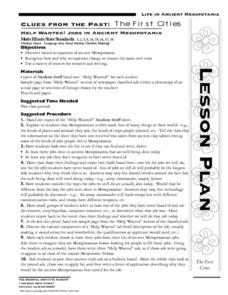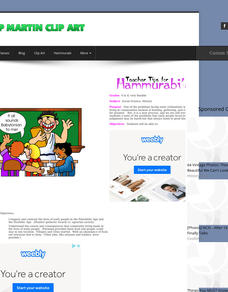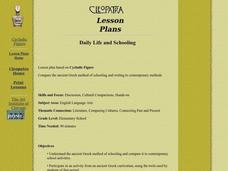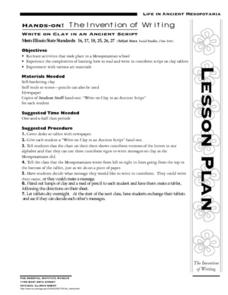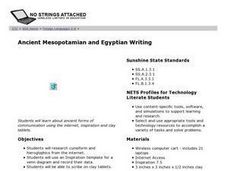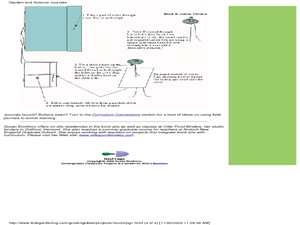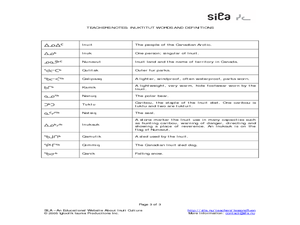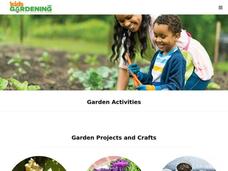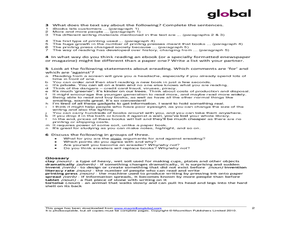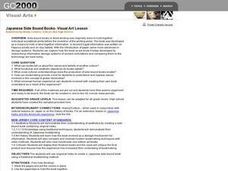Curated OER
Lesson: Nimble Symbols
Comparative thinking is one way to build critical analysts. Budding artists discuss symbols and how they represent concepts, beliefs, or ideas. They compare the symbols found on an ancient Egyptian mummy case to those found in...
Curated OER
Babylonian Mathematics I
Learners examine a Babylonian clay tablet and the mathematics found on it as a catalyst to investigate a variety of mathematical ideas. They work with prime numbers, classify numbers as whole, integer, rational, or irrational and use...
Curated OER
Help Wanted! Jobs in Ancient Mesopotamia
Students explore life in early Mesopotamia through a list of jobs that people taken from an ancient clay tablet found in Mesopotamia. The list is compare to jobs still performed in today's society.
Curated OER
Writing Exercise: Ancient Sumer
When summer is over, it's time to get started on Sumer! Get your scholars writing about Ancient Sumer civilizations in this exercise, which features five short-answer prompts. Writers will describe Fertile Crescent Geography, compare and...
DiscoverE
Rocket Challenge
You might just be responsible for launching a future career in rocket science. Pupils use Alka-Seltzer® tablets as the power source for a film-canister rocket. These rockets must able to carry a clay payload and hit a target on a wall.
Curated OER
Ancient Mesopotamia
In this geography worksheet, students read about ancient Mesopotamia and respond to five short answer questions that follow. They identify what part of the country was the heart of Mesopotamia. Then students compare the given map with a...
Curated OER
Hammurabi's Code of Laws
Students explore why the need arose for laws to govern society, comparing and contrasting hunter/gatherer societies vs. agrarian societies. They write letters to the editor of the Babylonian Times, discussing their opinion of Hammurabi's...
Curated OER
Daily Life and Schooling
Students compare the ancient Greek method of schooling and writing to contemporary methods and learn the Greek alphabet on wax tablets.
Curated OER
Hands-On! The Invention of Writing
Students are introduced to the way writing was invented in Mesopotamia. In groups, they participate in re-creations of events that occured in a traditional Mesopotamian school. They practice writing in cuneiform script on clay using...
Curated OER
Ancient Mesopotamian and Egyptian Writing
Students research cuneiform and hieroglyphics from the internet and use educational software to create their own cuneiform tablet in this excellent World History lesson. The use of the computer software program Inspiration 7.5 is...
Curated OER
Architectural Buildings
Fifth graders explore various styles of architecture. They work together to create a town with clay buildings that come together in order to form this small town. They discuss maps, layouts, and the structure of buildings.
EngageNY
Systems of Equations Leading to Pythagorean Triples
Find Pythagorean Triples like the ancient Babylonians. The resource presents the concept of Pythagorean Triples. It provides the system of equations the Babylonians used to calculate Pythagorean Triples more than 4,000 years ago. Pupils...
Syracuse University
Ancient World Writing System
Most twenty-first century pupils don't know how to interpret cuneiform. Examining images of cuneiform and papyrus writing and using a chart and Venn diagram, young historians extrapolate what life may have been like for people who lived...
Curated OER
Making Field Journals
Students follow a bookmaking format to create a book and use it as a garden journal. In this science journal lesson plan, students follow book making directions to create a garden and science journal.
Curated OER
Reading Comprehension: Counting
In this informational text comprehension worksheet, 3rd graders read the passage about counting and answer 10 multiple choice questions about the passage.
Curated OER
Inuktitut
Students explore Inuit language. In this Inuktitut instructional activity, students listen to a lecture about the history and phonology of the Inuit language. Students create Inuktitut-English dictionaries with...
Curated OER
Making Maps
In this map making worksheet, students learn about the science of making maps, which is cartography. They then answer the 11 questions on the worksheet. The answers are on the last page.
Curated OER
Julie Chen: Thinking Outside the Book
Students create an original art book after studying nontraditional boomaking. In this visual arts instructional activity, students watch a video on the work of Julie Chen and discuss the concept of books as three-dimensional art. Then...
Curated OER
Making Paper
Young scholars read about the history of paper production and make their own recycled paper. In this paper making activity, students follow the directions to make paper from recycled paper. Young scholars also learn about making paper...
Curated OER
Global News: The Changing Face of Reading
A current and engaging informational text with some superb scaffolding activities, this six paragraph article discusses the release of the iPad from Apple, eBooks, and the history of reading and writing materials. After reading the...
Curated OER
Babylonian Mathematics 2
Students research Babylonian mathematics. They calculate simple surd numbers. Students find the fractional form of rational numbers expressed as decimals. They work with numbers in base 60.
Curated OER
Babylonian Square Roots
Learners are introduced to a method for finding square roots used by the Babylonian people of Mesopotamia. The method involves dividing and averaging, over and over, to find a more accurate solution with each repeat of the process.
Curated OER
Japanese Side Bound Books
Students create Japanese side-bound books using traditional bookbinding methods and original Haikus in this Art instructional activity for the High School classroom. The instructional activity can be modified for any grade level and can...
Curated OER
Help Wanted! Jobs in Ancient America
Young scholars are introduced to the various occupations in Mesopotamia. In groups, they discuss the reasons for occupations changing over time. They use the internet to research the ancient jobs of their choice and write a paper...




